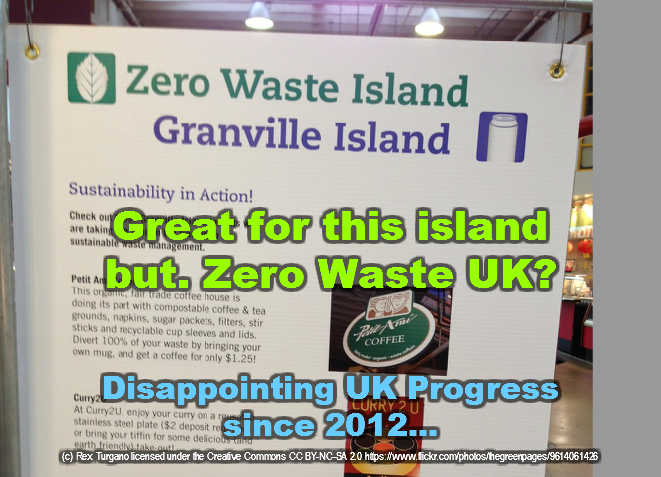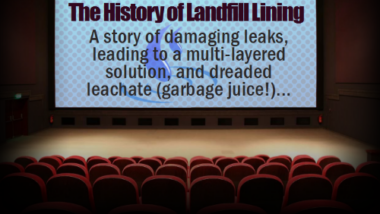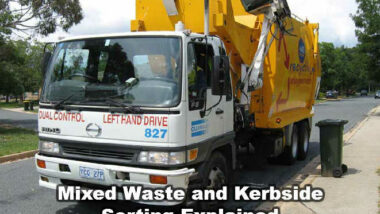
The Public Would Like All Landfilling to Stop and That’s How The Idea of “Zero Waste” Was Born
Since around about 2010 the idea of not sending any waste to landfill has been becoming more and more popular, and the UK government (for England) the Welsh Assembly and the Scottish Government are all now committed to working toward “zero waste” to landfill.
It Wasn't Always Like This So How Did We Get to This Point of “Zero Waste” Commitment?
Until about 2005 about 85% of UK waste was being sent to landfill so how did policy change to set the target at zero. The first big step came when the EU enacted the Landfill Directives. Read on and we will explain that.
The EU Landfill Directive 1999/31 came into force in the EU on 16 July 1999. For the most part, this law came into force for the UK, in June 2002, under the new Landfill (England and Wales) Regulations 2002.
The main provisions, which this brought in, and which were applied to all new and existing landfill sites, and which are still in-force, are:
- Classification of landfills into three types by 2004: hazardous, non hazardous, and inert waste, ending the previous UK practice of co-disposing of hazardous and non-hazardous waste in the same landfills;
- Bans on the disposal of certain wastes in landfill, including liquid wastes, certain hazardous wastes, and tyres;
- The treatment of most wastes before they are placed in a landfill, by July 2004;
- Introduction of waste acceptance criteria setting out types of waste to be accepted at each of the three types of landfill.
The UK was been given four extra years by the EU to meet some of the requirements of the Directive because we were so dependent on landfill, and desperately lacking in the necessary alternative facilities for sorting the waste and recycling it.
Resources: Landfill Statute Links:
The statutory instruments under which landfills are regulated in the UK (England & Wales) are:
| For compliance with the EU Landfill Directive: | Statutory Instrument 2002 No. 1559:The Landfill (England and Wales) Regulations 2002 |
| For compliance with the EU Integrated Pollution Prevention & Control Directive | Draft Statutory Instrument 2000 No. The Pollution Prevention and Control (England and Wales) Regulations 2000 |
The Scottish Executive and the Northern Ireland Assembly have implemented separate legislation to implement these Directives.Waste Arisings:
How much waste do we produce in the UK?In the United Kingdom. on average each person throws away seven times their own body weight in rubbish each year (2004).
Breakdown of Municipal, Industrial and Commercial Waste arisings in UK per annum 1998/9:
Autumn 2012: Article Update
We found the following quotation from PolicyConnect which neatly explains the current progress achieved by the UK on the path towards “zero waste”.“
According to a new report published by the European Commission, the UK remains outside of the EU's top performers in terms of landfill diversion, despite significantly reducing the amount of waste it landfills.
The EU's best-performing member states include: Denmark, Belgium, Sweden, Germany and the Netherlands, who all sent less than 3% of their waste to landfill in 2010, in comparison to 48% of UK waste sent to landfill.
The report did show, however, that the UK has nearly halved the amount of municipal waste per capita sent to landfill, with a reduction from 464kg, per person per year, to 259kg.
The report comments that the introduction of the Landfill Tax in 1996 has ‘demonstrably contributed' to this reduction. Other EU member states with a significantly lower rate of Lanfill Tax were shown to landfill around 60% of their municipal waste.”
Autumn 2014: Article Update
Due to UK government spending cut-backs, and the fact that once landfill tax exceeded the cost of waste recycling and businesses started to recycle because it became cheaper, the rate of improvement in recycling rates has almost halted.
Since, 2012 the UK waste management industry, lacking in any real government targets and with reduced funding, has stagnated.
The coalition government has promised “zero waste” in England, but the reality is that this is no more than a pipe-dream while current reduced government spending and a lack of clear waste policy, continues.
The Future of UK Food Waste Management – Simpler Collections and Tougher Regulation
The future of UK food waste management will be a big push toward higher recycling rates through simpler collection and far greater consistency across the nations, helping citizens understand how to be green and recycle more organic waste. As the UK continues to advance its environmental goals, recently announced government policies aimed at simplifying waste […]
The Ultimate Guide To Recycling Plasterboard: How To Dispose Of Plasterboard Waste Properly
Plasterboard is a popular building material used in homes and offices. It's light, strong, and easy to work with. But when it turns into waste, we can't just throw it away like old food wrappers. Rules say plasterboard must not mix with other trash because it can harm the environment. Luckily, clean plasterboard can go […]
Unfashionable Talk About Landfills
Get ready for unfashionable talk about landfills! Let's talk rubbish—literally. You might not think about landfills much unless the smell drifts your way on a windy day or you're tossing out the garbage. But these dumping grounds are more than just piles of junk; they're a snapshot of our consumer habits and a challenge we need to tackle. Landfill […]
Street Sweeper Waste Management: A Comprehensive Guide
This is a story that ranges from cleaning streets to sustainability. Jump aboard as we uncover the fate of street sweeper waste. In the bustling streets of cities worldwide, street sweepers play a pivotal role in maintaining cleanliness and public health. However, the journey of the waste they collect is often overlooked. This article dives […]










